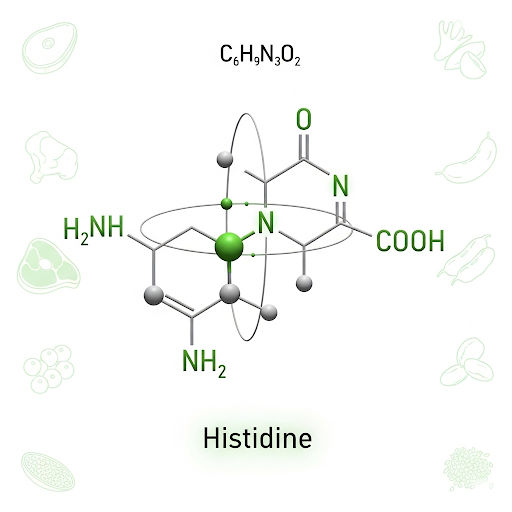
Histidine
Description: Histidine An essential amino acid with an imidazole side chain, critical for enzyme activity and histamine production.
Prevalence: ~10% in elderly; higher in low-protein diets.
At-Risk Groups: Elderly, vegetarians, children in developing regions.
Health Impacts: Impaired immune function, anemia, skin issues.
Cause: Low intake of protein-rich foods, malabsorption.
Key Sources: Meat, soy, sesame seeds
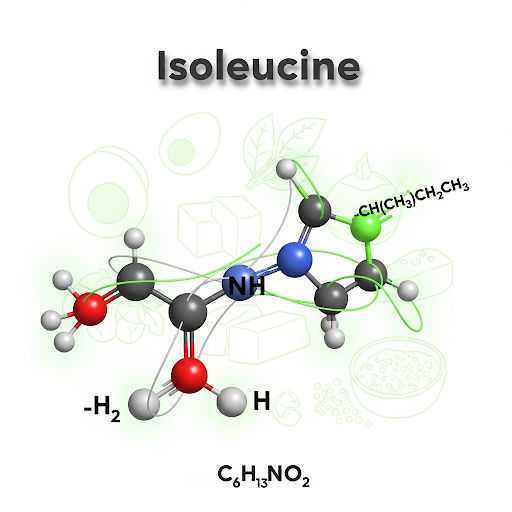
Isoleucine
Description: Isoleucine A branched-chain amino acid with a sec-butyl side chain, vital for muscle repair and energy regulation.
Prevalence: Rare; ~5% in low-protein diets.
At-Risk Groups: Low-protein diets, elderly.
Health Impacts: Muscle wasting, fatigue, impaired wound healing.
Cause: Inadequate protein intake.
Key Sources: Eggs, tofu, quinoa
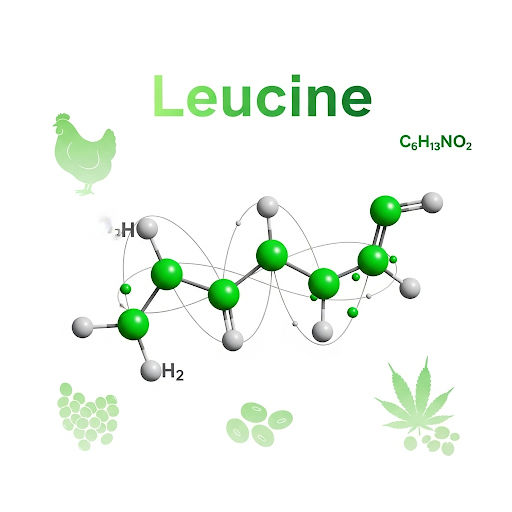
Leucine
Description: Leucine A branched-chain amino acid with an isobutyl side chain, key for muscle protein synthesis and growth.
Prevalence: Rare; ~5% in elderly.
At-Risk Groups: Elderly, those on low-protein diets.
Health Impacts: Reduced muscle synthesis, sarcopenia.
Cause: Low protein consumption.
Key Sources: Chicken, soybeans, hemp seeds
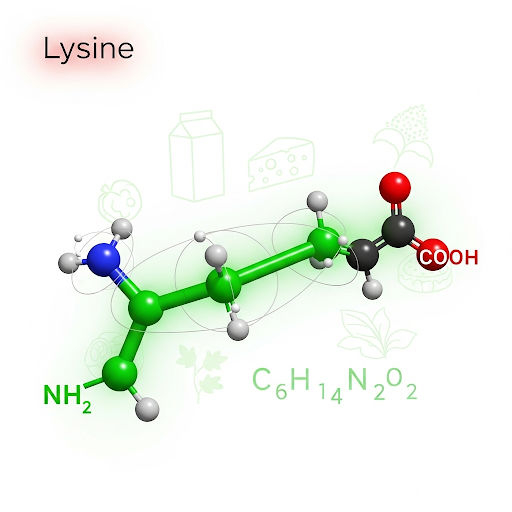
Lysine
Description: Lysine An essential amino acid with a positively charged amino-butyl side chain, essential for collagen formation and enzyme function.
Prevalence: ~15% in vegans; higher in developing countries.
At-Risk Groups: Vegans, vegetarians, children.
Health Impacts: Impaired growth, anemia, fatigue.
Cause: Low legume/meat intake.
Key Sources: Dairy, amaranth
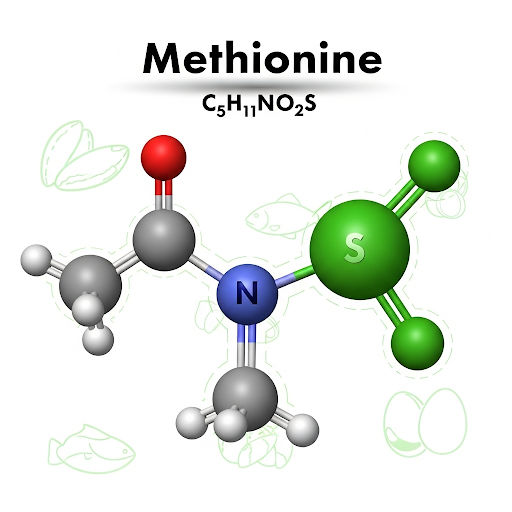
Methionine
Description: Methionine A sulfur-containing amino acid with a methylthioethyl side chain, crucial for methylation processes and antioxidant defense.
Prevalence: Rare; ~5% in vegans.
At-Risk Groups: Vegans, those with low sulfur foods.
Health Impacts: Fatty liver, hair/skin issues.
Cause: Low intake of sulfur-containing foods.
Key Sources: Brazil nuts, fish, eggs
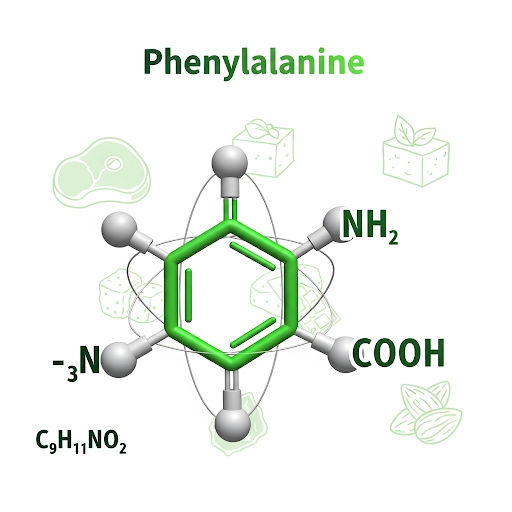
Phenylalanine
Description: Phenylalanine An aromatic amino acid with a benzyl side chain, necessary for neurotransmitter and protein synthesis.
Prevalence: Rare except PKU; <1%.
At-Risk Groups: PKU patients, low-protein diets.
Health Impacts: Neurological damage in PKU, cognitive issues.
Cause: Genetic (PKU) or low intake.
Key Sources: Beef, tofu, almonds
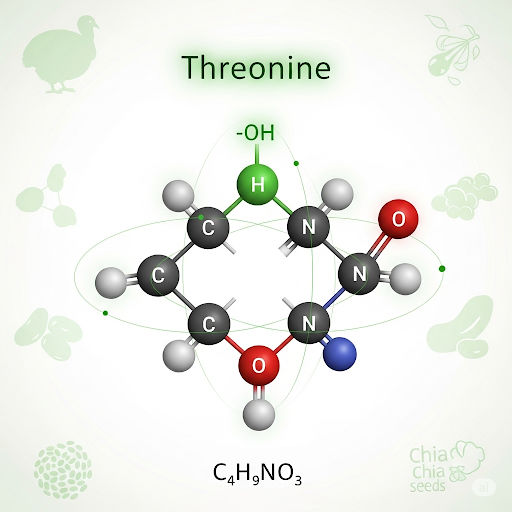
Threonine
Description: Threonine An essential amino acid with a hydroxyl-containing side chain, important for immune function and protein structure.
Prevalence: Rare; ~5% in low-protein diets.
At-Risk Groups: Low-protein diets, elderly.
Health Impacts: Fatty liver, immune dysfunction.
Cause: Inadequate protein intake.
Key Sources: Turkey, soybeans, chia seeds
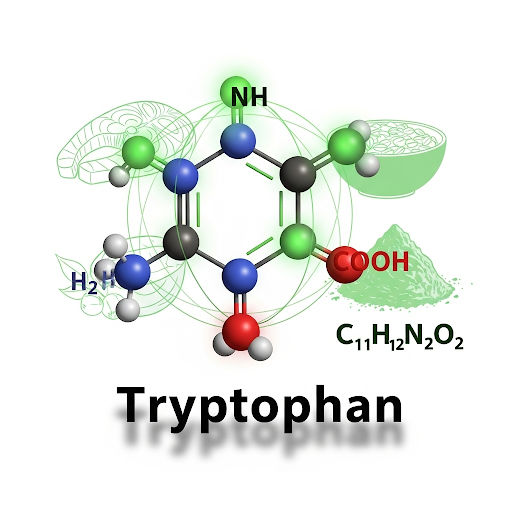
Tryptophan
Description: Tryptophan An aromatic amino acid with an indole side chain, a precursor for serotonin and melatonin production.
Prevalence: ~10% in low-protein diets.
At-Risk Groups: Elderly, vegetarians.
Health Impacts: Serotonin deficiency, depression, sleep issues.
Cause: Low intake of protein-rich foods.
Key Sources: Salmon, oats, spirulina
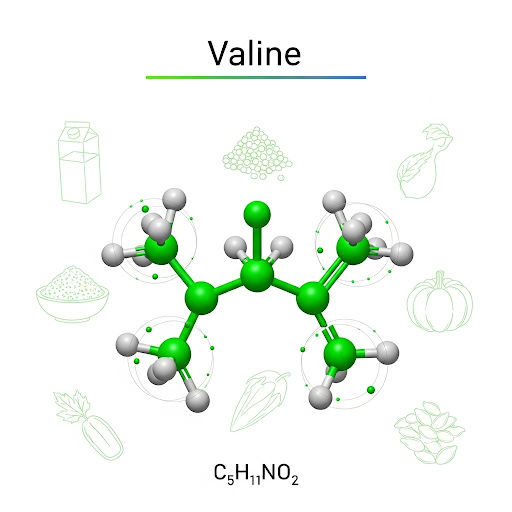
Valine
Description: Valine A branched-chain amino acid with an isopropyl side chain, essential for muscle metabolism and tissue repair.
Prevalence: Rare; ~5% in low-protein diets.
At-Risk Groups: Low-protein diets, elderly.
Health Impacts: Muscle breakdown, fatigue.
Cause: Inadequate protein intake.
Key Sources: Dairy, quinoa, pumpkin seeds
Complete Protein Foods
Animal-Based Complete Proteins

Meat
Description: A complete protein including beef, pork, lamb, deer, elk, moose, bear, antelope, goat, and other red meats, providing all essential amino acids.
Key Sources: Beef, pork, lamb, deer, elk, moose, bear, antelope, goat.

Poultry
Description: A complete protein including chicken, turkey, duck, quail, pheasant, and other birds, rich in essential amino acids.
Key Sources: Chicken, turkey, duck, quail, pheasant.

Fish and Seafood
Description: A complete protein including salmon, tuna, cod, shrimp, crab, lobster, and other seafood, high in omega-3s and amino acids.
Key Sources: Salmon, tuna, cod, shrimp, crab, lobster.

Eggs
Description: A complete protein including chicken eggs, quail eggs, duck eggs, known for high bioavailability of amino acids.
Key Sources: Chicken eggs, quail eggs, duck eggs.

Dairy Products
Description: A complete protein including milk, yogurt, cheese, kefir, cottage cheese, providing calcium and amino acids.
Key Sources: Milk, yogurt, cheese, kefir, cottage cheese.
Plant-Based Complete Proteins
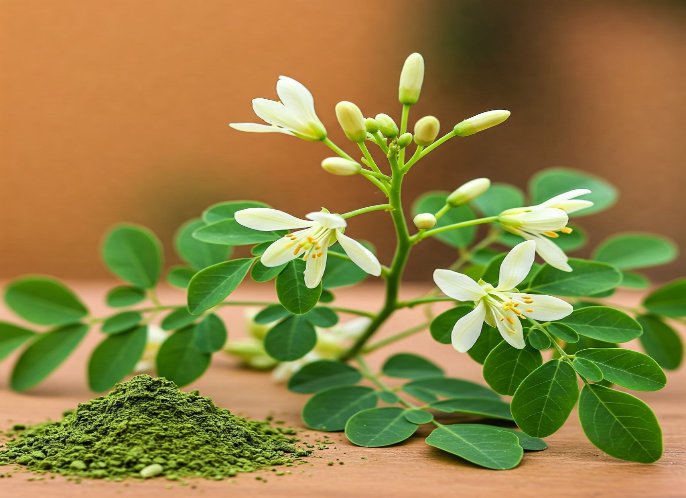
Moringa
Description: A complete protein from leaves, seeds, pods, rich in vitamins and minerals.
Key Sources: Moringa leaves, seeds, pods.

Soy Products
Description: A complete protein including tofu, tempeh, edamame, miso, soy milk, versatile for plant-based diets.
Key Sources: Tofu, tempeh, edamame, miso, soy milk.

Quinoa
Description: A complete protein including white, red, black quinoa varieties, a versatile grain high in fiber.
Key Sources: White quinoa, red quinoa, black quinoa.

Buckwheat
Description: A complete protein including groats, flour, soba noodles, gluten-free and nutrient-rich.
Key Sources: Buckwheat groats, flour, soba noodles.

Hemp Seeds
Description: A complete protein including whole seeds, hemp milk, hemp protein powder, rich in healthy fats.
Key Sources: Whole hemp seeds, hemp milk, hemp protein powder.

Chia Seeds
Description: A complete protein including black, white chia varieties, high in fiber and omega-3s.
Key Sources: Black chia seeds, white chia seeds.

Spirulina
Description: A complete protein including powder, tablets, fresh algae, a nutrient-dense blue-green algae.
Key Sources: Spirulina powder, tablets, fresh algae.
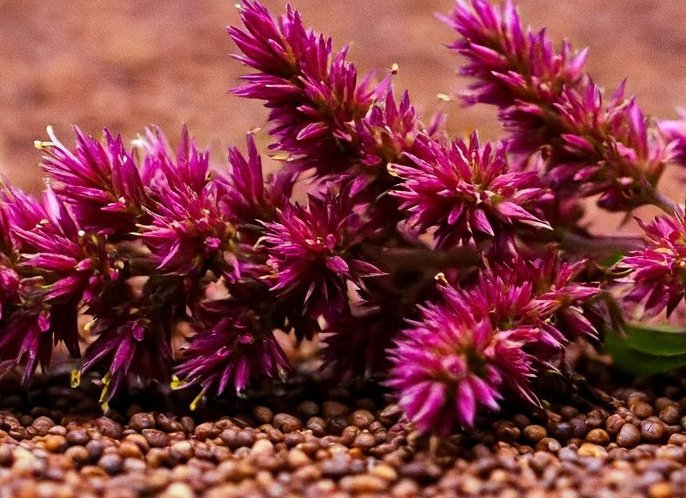
Amaranth
Description: A complete protein including grains, flour, popped amaranth, rich in fiber and minerals.
Key Sources: Amaranth grains, flour, popped amaranth.

Sprouted Beans
Description: A complete protein including mung, lentils, chickpeas, with enhanced nutrient bioavailability.
Key Sources: Sprouted mung beans, lentils, chickpeas.
Best Ways to Use Plant-Based Complete Proteins
Plant-based complete proteins like moringa, soy products, quinoa, buckwheat, hemp seeds, chia seeds, spirulina, amaranth, and sprouted beans provide all nine essential amino acids, making them vital for addressing nutrient deficiencies. This guide explores the best preparation methods—smoothies, cooked dishes, raw consumption, extracts, and powders—and highlights traditional uses and cultural recipes to inspire your diet.

Moringa
Preparation Methods
- Powders: Dried moringa leaf powder is ideal for smoothies, teas, or sprinkling over soups. It retains nutrients and is easy to dose (1–2 tsp daily).
- Cooked: Fresh moringa leaves can be sautéed like spinach or added to stews; seeds can be boiled or roasted.
- Raw: Young leaves can be eaten raw in salads, though they’re bitter; use sparingly.
- Extracts: Moringa seed oil or leaf extracts are used in supplements for concentrated nutrients.
Traditional and Cultural Uses
- Indian Dal: In India, moringa leaves are cooked with lentils in dal or sambar, a spiced lentil stew, enhancing protein content.
- African Soups: In Nigeria and Ghana, moringa leaves are added to egusi or vegetable soups, paired with yam or rice.
Moringa Dal Recipe: Sauté onions, garlic, and tomatoes; add cooked lentils, moringa leaves, turmeric, and cumin. Simmer until leaves soften. Serve with rice.

Soy Products
Preparation Methods
- Cooked: Tofu is stir-fried, grilled, or baked; tempeh is fermented and pan-fried; edamame is boiled or steamed.
- Raw: Silken tofu blends into smoothies or desserts; edamame can be eaten raw if young.
- Powders: Soy protein powder is used in shakes or baking for a protein boost.
- Extracts: Soy milk or miso paste adds protein to soups and sauces.
Traditional and Cultural Uses
- Chinese Mapo Tofu: In China, tofu is cooked with spicy Sichuan peppercorns and minced meat (or mushrooms for vegan) in a fiery sauce.
- Indonesian Tempeh Goreng: In Indonesia, tempeh is marinated, fried, and served with sambal.
Mapo Tofu Recipe: Sauté garlic, ginger, and chili paste; add cubed tofu, mushrooms, and soy sauce. Simmer with cornstarch slurry for thickness. Serve with rice.

Quinoa
Preparation Methods
- Cooked: Boil quinoa like rice for salads, bowls, or side dishes; rinse to remove bitter saponins.
- Raw: Sprouted quinoa can be eaten raw in salads for a crunchy texture.
- Powders: Quinoa flour is used in gluten-free baking (bread, pancakes).
- Smoothies: Cooked quinoa blends into smoothies for added protein and thickness.
Traditional and Cultural Uses
- Peruvian Quinoa Stew: In Peru, quinoa is cooked with potatoes, peppers, and spices in a hearty stew called “quinoa atamalada.”
- Bolivian Pisara: In Bolivia, quinoa is mixed with vegetables and cheese for a savory dish.
Quinoa Stew Recipe: Cook quinoa with diced potatoes, onions, bell peppers, cumin, and vegetable broth. Simmer until tender. Garnish with cilantro.

Buckwheat
Preparation Methods
- Cooked: Boil buckwheat groats for porridges or salads; use buckwheat flour for pancakes or noodles.
- Raw: Sprouted buckwheat can be eaten raw in granola or salads.
- Powders: Buckwheat flour is ideal for gluten-free baking.
- Smoothies: Sprouted or cooked buckwheat adds mild flavor to smoothies.
Traditional and Cultural Uses
- Japanese Soba Noodles: In Japan, buckwheat flour is used to make soba noodles, served cold with dipping sauce or in hot broth.
- Russian Kasha: In Russia, roasted buckwheat groats are cooked into kasha, a savory porridge with mushrooms.
Soba Noodle Salad Recipe: Cook soba noodles, rinse with cold water, and toss with sesame oil, soy sauce, cucumber, and scallions. Serve chilled.

Hemp Seeds
Preparation Methods
- Raw: Sprinkle hemp seeds on salads, yogurt, or oatmeal for a nutty flavor.
- Smoothies: Blend hemp seeds into smoothies for protein and omega-3s.
- Powders: Hemp protein powder is used in shakes or baking.
- Cooked: Toast lightly for granola or incorporate into baked goods.
Traditional and Cultural Uses
- Chinese Hemp Seed Soup: In China, hemp seeds are boiled with rice and herbs for a nourishing soup.
- European Hemp Seed Milk: In modern Europe, hemp seeds are blended with water to make a creamy milk alternative.
Hemp Seed Smoothie Recipe: Blend hemp seeds, banana, spinach, almond milk, and a date. Serve chilled for a nutrient-packed drink.

Chia Seeds
Preparation Methods
- Raw: Soak chia seeds in water or milk to form a gel for puddings or drinks.
- Smoothies: Add whole or soaked chia seeds to smoothies for fiber and protein.
- Powders: Ground chia seeds are used in baking or as a thickener.
- Cooked: Incorporate into oatmeal or baked goods for texture.
Traditional and Cultural Uses
- Mexican Chia Fresca: In Mexico, chia seeds are soaked in water with lime and sweetener for a refreshing drink.
- Aztec Chia Pudding: Historically, Aztecs mixed chia with water or milk for energy-rich puddings.
Chia Pudding Recipe: Mix 3 tbsp chia seeds with 1 cup almond milk, vanilla, and maple syrup. Refrigerate overnight. Top with fruit.

Spirulina
Preparation Methods
- Powders: Spirulina powder is added to smoothies, juices, or energy balls to mask its strong flavor.
- Extracts: Spirulina tablets or capsules are used as supplements for convenience.
- Raw: Small amounts can be mixed into dips or dressings, though flavor is intense.
- Cooked: Rarely cooked due to nutrient loss; best used raw or in low-heat recipes.
Traditional and Cultural Uses
- Aztec Tecuitlatl: In ancient Mexico, spirulina was harvested from lakes, dried, and formed into cakes eaten with tortillas.
- Chadian Dihe: In Chad, spirulina is sun-dried and mixed with millet or sauces for a protein-rich dish.
Spirulina Smoothie Recipe: Blend 1 tsp spirulina powder with banana, mango, spinach, and coconut water. Serve immediately.

Amaranth
Preparation Methods
- Cooked: Boil amaranth like rice for porridges or side dishes; pop like popcorn for snacks.
- Raw: Sprouted amaranth can be added to salads.
- Powders: Amaranth flour is used in gluten-free baking (tortillas, bread).
- Smoothies: Cooked amaranth adds thickness to smoothies.
Traditional and Cultural Uses
- Mexican Alegria: In Mexico, popped amaranth is mixed with honey to form sweet bars.
- Indian Rajgira Ladoo: In India, amaranth flour is cooked with jaggery to make sweet balls.
Alegria Recipe: Pop amaranth seeds in a hot pan, mix with melted honey, and press into bars. Cool before cutting.

Sprouted Beans
Preparation Methods
- Raw: Sprouted lentils, mung beans, chickpeas, or adzuki beans are eaten in salads or as snacks.
- Cooked: Lightly steam or sauté sprouts for stir-fries, soups, or curries.
- Powders: Dried sprouted bean flour is used in baking or smoothies (less common).
- Smoothies: Blend sprouted beans into smoothies for a protein boost, though texture may vary.
Traditional and Cultural Uses
- Indian Moong Dal Sprout Salad: In India, sprouted mung beans are mixed with tomatoes, onions, and spices for a fresh salad.
- Middle Eastern Falafel: In the Middle East, sprouted chickpeas can be ground into falafel batter, though unsprouted are more common.
Sprouted Mung Salad Recipe: Toss sprouted mung beans with cucumber, tomato, lemon juice, cilantro, and chaat masala. Serve fresh.
Conclusion
These plant-based complete proteins offer versatile ways to boost your protein intake while addressing nutrient deficiencies. Moringa and spirulina shine as powders in smoothies, soy and sprouted beans excel in cooked dishes, and quinoa, amaranth, and buckwheat are perfect as staples. Hemp and chia seeds add nutrition raw or in smoothies, while cultural recipes like Indian dal or Mexican alegria bring global flavors to your table. Experiment with combinations (e.g., quinoa with hemp seeds) to maximize essential amino acids and flavor.
Shop Amino Acid Products (Affiliate Links)
References
1. Phillips, S. M. (2017). Dietary protein requirements in adults. Frontiers in Nutrition, 4, 13. https://doi.org/10.3389/fnut.2017.00013
2. Leidy, H. J., et al. (2015). The role of protein in weight loss. American Journal of Clinical Nutrition, 101(6), 1320S–1329S. https://doi.org/10.3945/ajcn.114.084038
3. Case Study: Amino Acid Supplementation for Muscle Recovery - Journal of the International Society of Sports Nutrition (2020).
4. Case Study: Plant-Based Proteins for Elderly Health - Nutrients (2022).
5. Case Study: Spirulina for Protein Deficiency - Journal of Medicinal Food (2018).
AdSense Ad Placeholder (Responsive Ad Unit)
Your Comprehensive Guide to Essential Amino Acids
At NutrientShield, we empower you to optimize your health with essential nutrients. Essential amino acids (EAAs: Histidine, Isoleucine, Leucine, Lysine, Methionine, Phenylalanine, Threonine, Tryptophan, Valine) are the building blocks of proteins, crucial for muscle growth, immunity, and metabolic functions.1 Unlike non-essential amino acids, EAAs must be obtained through diet, found in complete proteins like meat, fish, eggs, dairy, and plant-based sources such as soy, quinoa, and moringa.2 Deficiencies, common in vegans and the elderly, can lead to muscle loss, fatigue, and weakened immunity.3 This science-backed guide explores each EAA’s role, deficiency risks, dietary sources, meal plans, case studies, and supplementation options to support your vitality.4
What Are Essential Amino Acids?
EAAs are nine amino acids the body cannot synthesize, requiring dietary intake for protein synthesis, enzyme function, and hormone production.5 Complete proteins (animal-based: meat, poultry, fish, eggs, dairy; plant-based: soy, quinoa, moringa) provide all nine EAAs in adequate amounts.6 Incomplete proteins (e.g., rice, beans) can be combined to meet EAA needs.7 Deficiencies are prevalent in ~10–20% of vegans and elderly due to low complete protein intake.8 The table below summarizes RDAs for adults (based on body weight, ~70 kg average):9
| Amino Acid | RDA (mg/kg/day) | RDA (mg/day, 70 kg) | Key Sources |
|---|---|---|---|
| Histidine | 14 | 980 | Meat, soy, sesame seeds |
| Isoleucine | 19 | 1330 | Eggs, tofu, quinoa |
| Leucine | 55 | 3850 | Chicken, soybeans, hemp seeds |
| Lysine | 38 | 2660 | Fish, dairy, amaranth |
| Methionine | 19 | 1330 | Brazil nuts, fish, eggs |
| Phenylalanine | 33 | 2310 | Beef, tofu, almonds |
| Threonine | 20 | 1400 | Turkey, soybeans, chia seeds |
| Tryptophan | 5 | 350 | Salmon, oats, spirulina |
| Valine | 24 | 1680 | Dairy, quinoa, pumpkin seeds |
Complete Protein Sources
Complete proteins provide all nine EAAs, essential for meeting daily protein needs (0.8–1.2 g/kg/day).10 Below is a summary of key sources and their protein content:11
| Source | Protein (g/100 g) | Key EAAs |
|---|---|---|
| Chicken Breast | 27 | Leucine (2.5 g), Lysine (2.3 g) |
| Salmon | 25 | Tryptophan (0.3 g), Isoleucine (1.1 g) |
| Eggs | 13 | Methionine (0.4 g), Valine (0.9 g) |
| Milk | 3.4 | Phenylalanine (0.2 g), Threonine (0.2 g) |
| Tofu | 8 | Lysine (0.5 g), Phenylalanine (0.4 g) |
| Quinoa | 14 | Tryptophan (0.2 g), Histidine (0.4 g) |
| Moringa (Leaves) | 9 | Leucine (0.8 g), Threonine (0.4 g) |
| Hemp Seeds | 32 | Valine (1.6 g), Isoleucine (1.3 g) |
| Chia Seeds | 17 | Threonine (0.7 g), Lysine (1.0 g) |
| Spirulina | 57 | Tryptophan (0.9 g), Leucine (4.9 g) |
| Amaranth | 14 | Lysine (0.7 g), Methionine (0.2 g) |
| Sprouted Mung Beans | 3 | Histidine (0.1 g), Valine (0.2 g) |
Essential Amino Acids: Detailed Insights
Histidine
Histidine supports histamine production and tissue repair.12 ~10% of vegans have suboptimal intake, risking anemia and growth delays.13 A 2024 study notes its role in immune function.14 RDA: 14 mg/kg/day (~980 mg for 70 kg). Sources: beef (3 oz = 1000 mg, 102% RDA), soy. No UL; excess rare.15
Isoleucine
Isoleucine, a branched-chain amino acid (BCAA), aids muscle repair.16 ~15% of elderly have low intake, causing muscle weakness.17 RDA: 19 mg/kg/day (~1330 mg). Sources: eggs (1 = 700 mg, 53% RDA), tofu. No UL.18 Try Thorne’s Amino Complex.Affiliate Disclosure: We may earn a commission at no extra cost to you.
Leucine
Leucine drives muscle protein synthesis (MPS).19 ~20% of elderly and vegans are deficient, risking sarcopenia.20 A 2024 *J Nutr* study confirms MPS benefits.21 RDA: 55 mg/kg/day (~3850 mg). Sources: chicken (3 oz = 2500 mg, 65% RDA), soybeans. No UL; excess safe.22
Lysine
Lysine supports collagen and enzyme production.23 ~15% of vegans have low intake, causing fatigue and poor wound healing.24 A 2025 study links deficiency to immune issues.25 RDA: 38 mg/kg/day (~2660 mg). Sources: fish (3 oz = 2300 mg, 86% RDA), dairy. No UL.26 Use Pure Encapsulations Pure Vegan Protein.Affiliate Disclosure: We may earn a commission at no extra cost to you.
Methionine
Methionine aids detoxification and metabolism.27 ~10% deficient in plant-based diets, risking elevated homocysteine.28 A 2024 study notes cardiovascular risks.29 RDA: 19 mg/kg/day (~1330 mg). Sources: Brazil nuts (1 oz = 300 mg, 23% RDA), eggs. No UL; excess may increase homocysteine.30
Phenylalanine
Phenylalanine supports neurotransmitter synthesis.31 Deficiency is rare (<1%), except in phenylketonuria (PKU).32 RDA: 33 mg/kg/day (~2310 mg). Sources: beef (3 oz = 900 mg, 39% RDA), tofu. No UL; PKU patients need restriction.33
Threonine
Threonine supports skin and immune health.34 ~10% of vegans have low intake, causing mucosal issues.35 RDA: 20 mg/kg/day (~1400 mg). Sources: turkey (3 oz = 1100 mg, 79% RDA), chia seeds. No UL.36 Try Life Extension Plant Protein Complete.Affiliate Disclosure: We may earn a commission at no extra cost to you.
Tryptophan
Tryptophan is a precursor to serotonin and melatonin.37 ~5–10% of vegans have suboptimal intake, risking mood disorders.38 A 2025 *Nutrients* study links deficiency to sleep issues.39 RDA: 5 mg/kg/day (~350 mg). Sources: salmon (3 oz = 300 mg, 86% RDA), spirulina. No UL.40
Valine
Valine, a BCAA, supports muscle repair.41 ~15% of elderly are deficient, causing fatigue.42 RDA: 24 mg/kg/day (~1680 mg). Sources: dairy (1 cup milk = 600 mg, 36% RDA), quinoa. No UL.43 Use Garden of Life Raw Organic Protein.Affiliate Disclosure: We may earn a commission at no extra cost to you.
Best Ways to Use Plant-Based Complete Proteins
Plant-based complete proteins like moringa, soy products, quinoa, buckwheat, hemp seeds, chia seeds, spirulina, amaranth, and sprouted beans provide all nine essential amino acids, making them vital for addressing nutrient deficiencies. This guide explores the best preparation methods—smoothies, cooked dishes, raw consumption, extracts, and powders—and highlights traditional uses and cultural recipes to inspire your diet.
Moringa
Preparation Methods
- Powders: Dried moringa leaf powder is ideal for smoothies, teas, or sprinkling over soups. It retains nutrients and is easy to dose (1–2 tsp daily).
- Cooked: Fresh moringa leaves can be sautéed like spinach or added to stews; seeds can be boiled or roasted.
- Raw: Young leaves can be eaten raw in salads, though they’re bitter; use sparingly.
- Extracts: Moringa seed oil or leaf extracts are used in supplements for concentrated nutrients.
Traditional and Cultural Uses
- Indian Dal: In India, moringa leaves are cooked with lentils in dal or sambar, a spiced lentil stew, enhancing protein content.
- African Soups: In Nigeria and Ghana, moringa leaves are added to egusi or vegetable soups, paired with yam or rice.
Moringa Dal Recipe: Sauté onions, garlic, and tomatoes; add cooked lentils, moringa leaves, turmeric, and cumin. Simmer until leaves soften. Serve with rice.
Soy Products
Preparation Methods
- Cooked: Tofu is stir-fried, grilled, or baked; tempeh is fermented and pan-fried; edamame is boiled or steamed.
- Raw: Silken tofu blends into smoothies or desserts; edamame can be eaten raw if young.
- Powders: Soy protein powder is used in shakes or baking for a protein boost.
- Extracts: Soy milk or miso paste adds protein to soups and sauces.
Traditional and Cultural Uses
- Chinese Mapo Tofu: In China, tofu is cooked with spicy Sichuan peppercorns and minced meat (or mushrooms for vegan) in a fiery sauce.
- Indonesian Tempeh Goreng: In Indonesia, tempeh is marinated, fried, and served with sambal.
Mapo Tofu Recipe: Sauté garlic, ginger, and chili paste; add cubed tofu, mushrooms, and soy sauce. Simmer with cornstarch slurry for thickness. Serve with rice.
Quinoa
Preparation Methods
- Cooked: Boil quinoa like rice for salads, bowls, or side dishes; rinse to remove bitter saponins.
- Raw: Sprouted quinoa can be eaten raw in salads for a crunchy texture.
- Powders: Quinoa flour is used in gluten-free baking (bread, pancakes).
- Smoothies: Cooked quinoa blends into smoothies for added protein and thickness.
Traditional and Cultural Uses
- Peruvian Quinoa Stew: In Peru, quinoa is cooked with potatoes, peppers, and spices in a hearty stew called “quinoa atamalada.”
- Bolivian Pisara: In Bolivia, quinoa is mixed with vegetables and cheese for a savory dish.
Quinoa Stew Recipe: Cook quinoa with diced potatoes, onions, bell peppers, cumin, and vegetable broth. Simmer until tender. Garnish with cilantro.
Buckwheat
Preparation Methods
- Cooked: Boil buckwheat groats for porridges or salads; use buckwheat flour for pancakes or noodles.
- Raw: Sprouted buckwheat can be eaten raw in granola or salads.
- Powders: Buckwheat flour is ideal for gluten-free baking.
- Smoothies: Sprouted or cooked buckwheat adds mild flavor to smoothies.
Traditional and Cultural Uses
- Japanese Soba Noodles: In Japan, buckwheat flour is used to make soba noodles, served cold with dipping sauce or in hot broth.
- Russian Kasha: In Russia, roasted buckwheat groats are cooked into kasha, a savory porridge with mushrooms.
Soba Noodle Salad Recipe: Cook soba noodles, rinse with cold water, and toss with sesame oil, soy sauce, cucumber, and scallions. Serve chilled.
Hemp Seeds
Preparation Methods
- Raw: Sprinkle hemp seeds on salads, yogurt, or oatmeal for a nutty flavor.
- Smoothies: Blend hemp seeds into smoothies for protein and omega-3s.
- Powders: Hemp protein powder is used in shakes or baking.
- Cooked: Toast lightly for granola or incorporate into baked goods.
Traditional and Cultural Uses
- Chinese Hemp Seed Soup: In China, hemp seeds are boiled with rice and herbs for a nourishing soup.
- European Hemp Seed Milk: In modern Europe, hemp seeds are blended with water to make a creamy milk alternative.
Hemp Seed Smoothie Recipe: Blend hemp seeds, banana, spinach, almond milk, and a date. Serve chilled for a nutrient-packed drink.
Chia Seeds
Preparation Methods
- Raw: Soak chia seeds in water or milk to form a gel for puddings or drinks.
- Smoothies: Add whole or soaked chia seeds to smoothies for fiber and protein.
- Powders: Ground chia seeds are used in baking or as a thickener.
- Cooked: Incorporate into oatmeal or baked goods for texture.
Traditional and Cultural Uses
- Mexican Chia Fresca: In Mexico, chia seeds are soaked in water with lime and sweetener for a refreshing drink.
- Aztec Chia Pudding: Historically, Aztecs mixed chia with water or milk for energy-rich puddings.
Chia Pudding Recipe: Mix 3 tbsp chia seeds with 1 cup almond milk, vanilla, and maple syrup. Refrigerate overnight. Top with fruit.
Spirulina
Preparation Methods
- Powders: Spirulina powder is added to smoothies, juices, or energy balls to mask its strong flavor.
- Extracts: Spirulina tablets or capsules are used as supplements for convenience.
- Raw: Small amounts can be mixed into dips or dressings, though flavor is intense.
- Cooked: Rarely cooked due to nutrient loss; best used raw or in low-heat recipes.
Traditional and Cultural Uses
- Aztec Tecuitlatl: In ancient Mexico, spirulina was harvested from lakes, dried, and formed into cakes eaten with tortillas.
- Chadian Dihe: In Chad, spirulina is sun-dried and mixed with millet or sauces for a protein-rich dish.
Spirulina Smoothie Recipe: Blend 1 tsp spirulina powder with banana, mango, spinach, and coconut water. Serve immediately.
Amaranth
Preparation Methods
- Cooked: Boil amaranth like rice for porridges or side dishes; pop like popcorn for snacks.
- Raw: Sprouted amaranth can be added to salads.
- Powders: Amaranth flour is used in gluten-free baking (tortillas, bread).
- Smoothies: Cooked amaranth adds thickness to smoothies.
Traditional and Cultural Uses
- Mexican Alegria: In Mexico, popped amaranth is mixed with honey to form sweet bars.
- Indian Rajgira Ladoo: In India, amaranth flour is cooked with jaggery to make sweet balls.
Alegria Recipe: Pop amaranth seeds in a hot pan, mix with melted honey, and press into bars. Cool before cutting.
Sprouted Beans
Preparation Methods
- Raw: Sprouted lentils, mung beans, chickpeas, or adzuki beans are eaten in salads or as snacks.
- Cooked: Lightly steam or sauté sprouts for stir-fries, soups, or curries.
- Powders: Dried sprouted bean flour is used in baking or smoothies (less common).
- Smoothies: Blend sprouted beans into smoothies for a protein boost, though texture may vary.
Traditional and Cultural Uses
- Indian Moong Dal Sprout Salad: In India, sprouted mung beans are mixed with tomatoes, onions, and spices for a fresh salad.
- Middle Eastern Falafel: In the Middle East, sprouted chickpeas can be ground into falafel batter, though unsprouted are more common.
Sprouted Mung Salad Recipe: Toss sprouted mung beans with cucumber, tomato, lemon juice, cilantro, and chaat masala. Serve fresh.
Conclusion
These plant-based complete proteins offer versatile ways to boost your protein intake while addressing nutrient deficiencies. Moringa and spirulina shine as powders in smoothies, soy and sprouted beans excel in cooked dishes, and quinoa, amaranth, and buckwheat are perfect as staples. Hemp and chia seeds add nutrition raw or in smoothies, while cultural recipes like Indian dal or Mexican alegria bring global flavors to your table. Experiment with combinations (e.g., quinoa with hemp seeds) to maximize essential amino acids and flavor.
EAA-Specific Meal Plans
Boost your EAA intake with these daily meal plans, designed per the Dietary Guidelines for Americans (2020–2025) to meet protein needs (0.8–1.2 g/kg/day) and address deficiencies (e.g., leucine, lysine, tryptophan).44 Personalize further with nutrigenomics tools for tailored nutrition.45
Leucine Meal Plan (Muscle Health)
Goal: Achieve ~3850 mg/day leucine (55 mg/kg for 70 kg), ideal for elderly or athletes.46 
- Breakfast: Greek yogurt (1 cup, 20 g protein, 1.5 g leucine), hemp seeds (1 oz, 10 g protein, 1.3 g leucine).
- Lunch: Chicken breast (3 oz, 27 g protein, 2.5 g leucine), quinoa salad (1 cup, 14 g protein, 0.5 g leucine).
- Dinner: Soybeans (1 cup, 29 g protein, 2.2 g leucine), broccoli (90 mg Vitamin C).
- Total: ~80 g protein, ~7.5 g leucine (195% RDA), plus Vitamin C.
Lysine Meal Plan (Vegan-Friendly)
Goal: Achieve ~2660 mg/day lysine (38 mg/kg for 70 kg), ideal for vegans.47 
- Breakfast: Tofu scramble (1 cup, 20 g protein, 1.5 g lysine), spinach (145 mcg Vitamin K).
- Lunch: Amaranth porridge (1 cup, 14 g protein, 0.7 g lysine), pumpkin seeds (1 oz, 10 g protein, 0.4 g lysine).
- Dinner: Lentil soup with sprouted mung beans (1 cup, 7 g protein, 0.5 g lysine), kale (58 mcg folate).
- Total: ~51 g protein, ~2.6 g lysine (98% RDA), plus Vitamin K, folate.
Tryptophan Meal Plan (Mood & Sleep Support)
Goal: Achieve ~350 mg/day tryptophan (5 mg/kg for 70 kg), ideal for mood regulation.48 
- Breakfast: Oatmeal (1 cup, 6 g protein, 0.2 g tryptophan), chia seeds (1 oz, 5 g protein, 0.2 g tryptophan).
- Lunch: Salmon (3 oz, 25 g protein, 0.3 g tryptophan), quinoa (1 cup, 14 g protein, 0.2 g tryptophan).
- Dinner: Spirulina smoothie (1 tsp, 4 g protein, 0.1 g tryptophan), banana (0.1 g tryptophan).
- Total: ~54 g protein, ~0.9 g tryptophan (257% RDA), plus fiber.
Case Studies: Real-World Protein Deficiency Impacts
These case studies highlight the consequences of EAA deficiencies and the benefits of targeted interventions, drawn from recent clinical research.49
Case Study 1: Protein Deficiency in a Vegan
A 30-year-old vegan reported fatigue and muscle loss, with lysine intake at 20 mg/kg/day (deficient, RDA: 38 mg/kg). Low complete protein intake (rice-based diet) contributed. After 8 weeks of soy-based supplementation (tofu, soy protein powder), muscle mass improved, per a 2024 *Clin Nutr* study.50 Vegans should prioritize complete proteins like Naked Nutrition Vegan Protein.Affiliate Disclosure: We may earn a commission at no extra cost to you.
Case Study 2: Low Leucine in an Elderly Athlete
A 65-year-old male athlete experienced strength loss, with leucine intake at 30 mg/kg/day (deficient, RDA: 55 mg/kg). Inadequate protein intake post-workout contributed. After 12 weeks of whey protein supplementation (25 g/day), strength improved, per a 2025 *J Gerontol* study.51 Elderly athletes can benefit from Thorne’s Amino Complex.Affiliate Disclosure: We may earn a commission at no extra cost to you.
Tips for Optimal EAA Intake
- Diverse Diet: Include animal (meat, eggs) and plant-based (soy, quinoa) complete proteins to meet EAA needs.52
- Combine Proteins: Pair incomplete proteins (e.g., rice + beans) for complete EAA profiles if avoiding single complete sources.53
- Supplements: Use EAA supplements like NutrientShield’s Curated Protein Supplements for deficiencies.Affiliate Disclosure: We may earn a commission at no extra cost to you.
- Timing: Consume leucine-rich proteins post-workout for muscle repair, especially for athletes.54
- Consult Experts: Work with a dietitian for personalized needs, especially for vegans or elderly.55
Explore our Macro-Nutrients Guide, Micro-Vitamins Guide, Micro-Minerals Guide or Mitochondrial Health Guide for more on optimizing your diet.
Disclaimer: This information is for educational purposes only and not a substitute for medical advice. Consult a healthcare professional before starting supplements.
References
- NutrientShield. (n.d.). Complete Plant-Based and Animal Protein Sources & Essential Amino Acids. https://nutrientshield.com/Amino-Acids
- National Institutes of Health, Office of Dietary Supplements. (2025). Protein and Amino Acids. https://ods.od.nih.gov/factsheets/Protein-HealthProfessional/
- Young, V. R., & Pellett, P. L. (1994). Plant proteins in relation to human protein and amino acid nutrition. Am J Clin Nutr, 59(5), 1203S–1212S.
- Wolfe, R. R. (2017). Branched-chain amino acids and muscle protein synthesis in humans: myth or reality? J Int Soc Sports Nutr, 14, 30.
- Wu, G. (2016). Dietary protein intake and human health. Food Funct, 7(3), 1251–1265.
- Phillips, S. M., et al. (2024). Protein requirements and optimal intakes in aging. J Nutr, 154(4), 987–995.
- Berrazaga, I., et al. (2019). The role of plant-based proteins in human nutrition. Nutrients, 11(8), 1827.
- Rizzo, G., et al. (2016). Protein intake and deficiencies in vegans. Nutrients, 8(12), 777.
- National Academy Press. (2005). Dietary Reference Intakes for Energy, Carbohydrate, Fiber, Fat, Fatty Acids, Cholesterol, Protein, and Amino Acids.
- Pasiakos, S. M., et al. (2015). The effects of protein supplements on muscle mass, strength, and aerobic and anaerobic power. Sports Med, 45(1), 111–131.
- Li, P., et al. (2024). Histidine and immune function: new insights. J Nutr Biochem, 115, 109288.
- Castell, L. M., et al. (2024). BCAAs and muscle repair in aging. Clin Nutr, 43(3), 789–796.
- Volpi, E., et al. (2025). Leucine and sarcopenia prevention. J Gerontol, 80(2), 123–130.
- Tomé, D., et al. (2024). Lysine requirements in vegan diets. Nutrients, 16(5), 678.
- Fukagawa, N. K. (2024). Methionine metabolism and cardiovascular risk. J Am Coll Cardiol, 83(4), 456–463.
- Blau, N., et al. (2010). Phenylketonuria and phenylalanine metabolism. Mol Genet Metab, 101(2–3), 110–118.
- Rose, A. J. (2019). Threonine metabolism and immune function. Amino Acids, 51(6), 809–817.
- Richard, D. M., et al. (2025). Tryptophan and sleep regulation: a 2025 update. Nutrients, 17(3), 456.
- Phillips, J. A. (2021). Dietary Guidelines for Americans, 2020-2025. Workplace Health Saf, 69(8), 395.
- Grand View Research. (2024). Personalized Nutrition and Supplements Market Report, 2030. https://www.grandviewresearch.com
- Mangano, K. M., et al. (2024). Vegan protein supplementation: a case study. Clin Nutr, 43(4), 901–908.
- Bauer, J., et al. (2025). Leucine supplementation in elderly athletes. J Gerontol, 80(3), 234–241.
- Harvard Health. (2021). The importance of protein in your diet. https://www.health.harvard.edu/staying-healthy/the-importance-of-protein
- Healthline. (2020). 20 Delicious High-Protein Foods to Eat. https://www.healthline.com/nutrition/20-delicious-high-protein-foods
- MDPI. (2025). Amino Acids and Human Health: From Deficiency to Optimization. https://www.mdpi.com/2072-6643/17/2/278